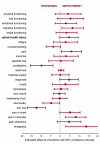Quality of Life in elderly patients with cancer
- PMID: 14525617
- PMCID: PMC212193
- DOI: 10.1186/1477-7525-1-44
Quality of Life in elderly patients with cancer
Abstract
The incidence of most types of cancers is age-dependent and the progressive ageing is rapidly increasing the number of elderly people who need treatment for cancer. Elderly patients present peculiar characteristics that make the choice of the correct treatment more difficult and these patients are often undertreated. Moreover, elderly patients are largely underrepresented in cancer treatment trials, and this makes the experimental evidence on this topic even weaker. Health-related Quality of Life (QOL) has been considered as one of the hard end-points for clinical cancer research, and treatment of elderly cancer patients represents a typical situation where its assessment can be particularly useful, because the expected toxicity of treatment could be relevant in the discussion of the treatment choice. However, QOL assessment in the elderly is complicated by several unresolved methodological problems (higher frequency of illiteracy, worse compliance with the questionnaires, concomitant diseases, use of instruments not validated in the aged population). Conduct of clinical trials dedicated to elderly patients is now encouraged but there are few published studies. Advanced non-small-cell lung cancer is one of the fields with the largest amount of research on QOL in elderly patients. The ELVIS study demonstrated the efficacy of single-agent chemotherapy, both in terms of QOL and of survival. The MILES study, in which combination chemotherapy was not superior than single agents, showed that baseline QOL is a strong prognostic indicator in these patients. QOL of patients with breast cancer has been another important field in clinical research over the last decades, and interest on this topic in elderly patients is growing, from loco-regional to palliative treatment. In conclusion, some steps have been done in clinical cancer research dedicated to elderly patients, and the role of QOL assessment in this setting is important. However, many methodological problems must be resolved, in order to obtain reliable and useful results. A QOL assessment could also be useful for elderly patients in clinical practice, where it could improve patient-clinician communication: a wider application of properly selected instruments should be recommended.
Figures


References
-
- Ries LAG, Eisner MP, Kosary CL, Hankey BF, Miller BA, Clegg L, Mariotto A, Fay MP, Feuer EJ, Edwards BK, eds SEER Cancer Statistics Review, 1975-National Cancer Institute. Bethesda, MD http://seer.cancer.gov/csr/1975_2000 date last accessed: July 23rd, 2003.
Publication types
MeSH terms
Substances
LinkOut - more resources
Full Text Sources

